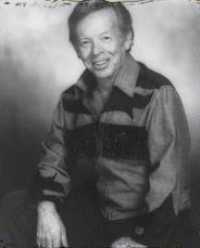Charlie Louvin was born in Henager, Alabama, in 1927. During the day he and his older brother Ira worked as field hands on the family farm. At night they would listen to the Delmore Brothers on their father's Victrola, and to the Grand Ole Opry on the radio. From modest beginnings, Ira and Charlie Louvin would themselves make it to the stage of the Opry. And there they would be heralded as one of the finest vocal teams in the history of country music.
The Louvin Brothers played their first paying job on the 4th of July, 1940, providing background music for a county fair's merry-go-round. They earned three dollars apiece that day, and were amazed at their instant wealth. Early in their career, the Louvins developed a distinctive style of harmony singing that would become their trademark. This blending of notes, called "shape note singing," was based on the gospel harmonies the brothers had learned in their church choir.
After a decade of hard work as struggling country and gospel performers, the Louvin Brothers got the chance to make their first record. But even with an MGM recording contract and later one with Capitol, success and acceptance in the world of country music was hard won. They continued to perform in the Alabama and Tennessee area, and for a short time in 1952 had a daily radio program out of Memphis.
The Louvin Brothers became members of the Grand Ole Opry in 1955, and were highly sought after for personal appearances. A young Elvis Presley was an opening act for the headlining Louvins during one of these 1955 tours. And by this time Ira and Charlie were having hit records. From the mid-1950s through the early 1960s the Louvin Brothers had over twenty entries on Billboard's country chart, including "I Don't Believe You've Met My Baby" and "Knoxville Girl." IN 1964, with rock 'n' roll overwhelming the music world, the brothers decided to split up and go separate ways. Sadly, Ira would be killed in a car accident in 1965. But Charlie continued to record numerous hits -- selling even more as a solo artist than he had with his brother.
Through their success on the radio and as live performers, the Louvins had a great impact on American music. Marshall Crenshaw calls them "tied with the Everly Brothers as the greatest harmony act" ever recorded. The late Gram Parsons was so taken with their songs that he paid people to search Los Angeles record shops for used copies of their out-of-print albums. He would use what he learned by listening to these records when recording with the Byrds and Emmylou Harris. And through Parsons, the Louvin Brothers would become known to a diverse set of younger listeners.
The name Louvin Brothers is linked to some of the most memorable vocals on record, and their place in the history of American music is assured. Luckily, fans no longer have to search used record stores for the Louvins' distinctive sound, since much of their catalogue is again in print. And equally fortunate, Charlie Louvin continues to create fresh recordings which remain true to the country music tradition. His newest release, on Watermelon Records, is called The Longest Train, and features a fine mix of Louvin Brothers classics and new material.
Charlie Louvin is an important member of country music's illustrious past. He continues to keep the flame of real country music burning every Friday and Saturday night on Nashville's Grand Ole Opry, of which he has been a member for over 40 years. And through live performances and studio recordings Charlie keeps demonstrating why he has been such a large influence on so many of today's performers. With The Longest Train, Charlie Louvin again shows his dedication to country music, and his mastery of the art form.
